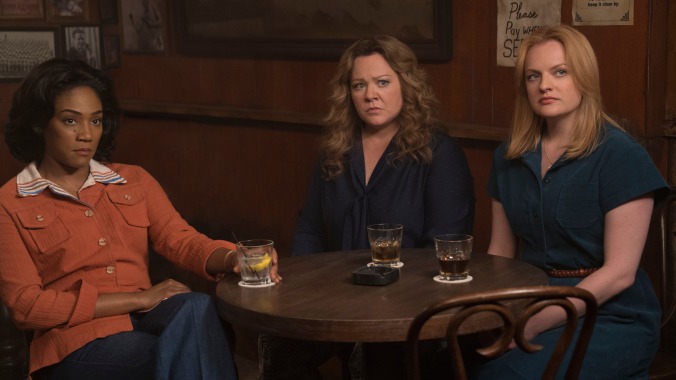Melissa McCarthy, Tiffany Haddish, and Elisabeth Moss can’t bring heat to The Kitchen


Gangland heavies have been shooting and stabbing their way across the screen since the earliest days of narrative filmmaking, but mob movies that focus on women are vanishingly rare. Some of the best and most well-known films in the genre—Goodfellas, The Godfather, The Untouchables—barely have women in them at all. This is not to invalidate those films’ indisputable greatness, but simply to point out that female-led mob movies are a cinematic niche in need of filling. Now, along comes The Kitchen, knocking down the backroom doors of organized crime with a revolver tucked into the waistband of its polyester slacks. But while the film boasts a refreshing premise—mob wives taking over their husbands’ territory when the men land themselves in jail—what lingers afterwards is the stale taste of its lukewarm execution.
Melissa McCarthy leads the ensemble as Kathy, the granddaughter of a Hell’s Kitchen Irish mob boss who genuinely views “the family” as a force for good, if only these lazy men would get off their asses and do it right. She’s also the only one in our core trio who has a good relationship with her husband (Jimmy, played be Brian D’Arcy James), one of the three men who somewhat implausibly get busted by the FBI for robbing a liquor store in the first act. The other two are physically abusive Rob (Jeremy Bobb) and serial cheater Kevin (James Badge Dale), both of whose ties with the other are as unconvincing as those between their wives, Claire (Elisabeth Moss) and Ruby (Tiffany Haddish). We watch Kathy, Claire, and Ruby walk down the street arm in arm on the night of their husbands’ arrests, and see them together frequently after that. We know there’s love—and tension—among the trio because the actors say so, but we never really get the feeling that there’s any significant history between them. It’s a relationship of narrative convenience, solidified over clichéd wine- and gabfests made far more interesting by the piles of cash on the coffee table.
Of the three leads, Moss has the most experience as a dramatic actress. But it’s McCarthy who steals the spotlight as Kathy, the only character in the film whose arc can’t be reduced to a one-note power narrative. The Kitchen does try to add some complexity to Claire’s and Ruby’s stories in its second half, but by then the shallow empowerment has already been baked in—particularly when it comes to Claire, whose quick and eager transformation from battered wife to cold-blooded killer would speak volumes about cycles of violence in a more thoughtful film. Here, however, it’s a “you go, girl” moment, albeit one that you’re not sure if you should be cheering for. As for Haddish, she keeps her head above water in her first major dramatic role, though she’s much more convincing as a cocky criminal kingpin than as the browbeaten wife and daughter-in-law she plays at the beginning of the story. (The mother-in-law in question is played by Margo Martindale, whose gruffness is wasted in this film. But she’s not as bad off as Common, who plays an FBI agent and often seems as though he’s still sitting in his trailer waiting for direction.)
The Kitchen is based on a Vertigo graphic novel, but its version of New York City—more specifically, Midtown Manhattan and parts of Brooklyn—is more akin to HBO’s The Deuce than any comic book depiction of the five boroughs. Even setting aside the shared late-’70s setting and Hell’s Kitchen’s proximity to Times Square, the two projects look enough alike that one wonders if they utilized some of the same sets, particularly when the camera pulls back for convincing-enough-from-a-distance crane shots overlooking trash-strewn sidewalks and porno theater marquees. The costuming similarly lives in a purgatory somewhere between authenticity and kitsch, as do the insufferably on-the-nose needle drops featuring not one but two tracks off of Fleetwood Mac’s Rumours.
Not all of writer-director Andrea Berloff’s flashy impulses are bad; there are a few fun smash cuts, for example. But in fixating on the core conceit of a gender-swapped mob movie, Berloff not only chooses to ignore some potentially rich (and feminist!) thematic threads—what makes a “strong female character?” Is it inherently empowering for women to behave as brutally as men?—she also allows spotty pacing, clunky dialogue, and baggy suspense to pass by unchecked. (Berloff is best known for co-writing the screenplay for Straight Outta Compton, another film that was willing to sand down the edges of its story in order to more conveniently fit a pre-determined genre formula.) Stories, and crime dramas in particular, are under no obligation to make their characters moral. In fact, they’re often more interesting when they’re not. But one would hope that edgy antiheroines like these would be a little more exciting to watch. Save yourself the disappointment and go rent Widows instead.